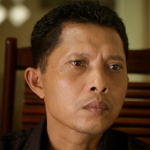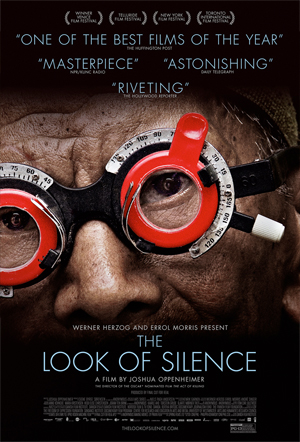 I’ve told you before and I’ll tell you again, THE ACT OF KILLING was, unexpectedly, one of the best movies I’d ever seen. And you might’ve said then, and might say now, “Okay, yeah, I heard I should see that, but did you say it was a documentary about genocide in Indonesia, and how the people that did it are still in power and treated as heroes and talk openly about what they did as if it’s something to brag about?”
I’ve told you before and I’ll tell you again, THE ACT OF KILLING was, unexpectedly, one of the best movies I’d ever seen. And you might’ve said then, and might say now, “Okay, yeah, I heard I should see that, but did you say it was a documentary about genocide in Indonesia, and how the people that did it are still in power and treated as heroes and talk openly about what they did as if it’s something to brag about?”
Yeah, okay, when you put it that way it sounds like not a good thing to watch on a Friday night. But sometimes it’s good to learn about the bad things in this world, and there are worse ways to do that than watching an absolutely fascinating, gorgeously shot film that works as an expose, a parable about the power of cinema, and a dark, sick, you-would-be-buckled-over-laughing-if-it-wasn’t-such-a-nightmare joke about the mundanity of evil. Parts of it play like a Christopher Guest mockumentary, but it’s real footage of actual war criminals trying to make a weird art movie glorifying their own atrocities.
Director Joshua Oppenheimer’s followup is a companion piece that’s less surreal, more intimate, but similarly profound. He continues on the same topic, but instead of focusing on the perpetrators he goes back to his original idea of following one of the survivors. To me that sounds like it would lose the unique hang-out-in-the-living-room-of-evil, give-them-enough-rope-to-hang-themselves power of the first movie, but it ends up being just as impressive because of the amazing person they focus on.
We don’t even know his name, but he was born a few years after his brother was murdered as a supposed communist in 1965. Both of his parents, who say they are over 100 years old (and his dad looks about 200) are still alive, and to them the emotional wounds still seem fresh.
 This man is in a unique spot between personal connection and distance. He seems driven to understand the people who did this to his family, or the people who let it happen. As an eye doctor for the elderly who makes house calls he casually brings up the topic and tries to get people who were there to talk about it. Eventually he tries to get up the balls to talk to the people who did it, or their loved ones. He sits and silently watches interview outtakes from THE ACT OF KILLING. Sometimes the killers talk about his brother by name. They laugh about what they did to him.
This man is in a unique spot between personal connection and distance. He seems driven to understand the people who did this to his family, or the people who let it happen. As an eye doctor for the elderly who makes house calls he casually brings up the topic and tries to get people who were there to talk about it. Eventually he tries to get up the balls to talk to the people who did it, or their loved ones. He sits and silently watches interview outtakes from THE ACT OF KILLING. Sometimes the killers talk about his brother by name. They laugh about what they did to him.
The most unbelievable thing about THE ACT OF KILLING was that these killers were so open about what they’d done, and would brag about it and celebrate it even though it seemed clear that on some level deep down they understood how sick and wrong it was. Here, happily, the most unbelievable thing is the inner strength of this man to go and confront these people, but to do it calmly and quietly. He gets them to talk and then instead of arguing with them he’ll just look at them silently, let their words sit there in the quiet and fizzle out on their own. It works every time. He doesn’t back down from saying what he needs to say, but he knows how to make the most powerful statements be the ones in between the words.
I know Indonesia is a Muslim country, otherwise I’d guess this guy was a Zen Buddhist. I don’t know how the fuck he does it. My heart would be beating out of my chest like a baby alien. How can a person be so intense and so gentle at the same time?
Each of his face-to-face talks are interesting in different ways. In one scene he surprises one of the perpetrators with the information about his brother being a victim, and the guy instantly becomes sad and apologetic. But after a few minutes of that his defenses kick in and you see him slide from a broken, remorseful man to a pathetic bully, making veiled (hopefully empty?) threats against the man and his family.
It’s a movie made up mostly of things you can’t believe you’re seeing, but there are two scenes in particular that struck me as important, especially in relation to each other. In the first one he talks to a perpetrator who had told him earlier that many of the killers went crazy from the trauma of what they were doing, but he himself didn’t because he drank their blood. You know, that old thing where you don’t go crazy if you kill someone and drink their blood (?).
But this time they talk about it in front of his daughter. She’s grown up hearing that her dad was a war hero. She must’ve had questions and suspicions, but it was easier to try to ignore them than to come to terms with them. At least before. Now he’s talking in front of her about drinking human blood. Telling a guy this. On camera. Her whole demeanor changes. She apologizes for her father, asks for forgiveness, tells the man that her family is his family now, hugs him. She seems completely sincere, and he seems to accept her as such. It’s an incredibly emotional moment that’s unlikely to happen, let alone be filmed.
In the second scene he talks to the family of a perpetrator who has passed away since being interviewed for THE ACT OF KILLING, but was so proud of his killings that he published an illustrated book about it. He even did a drawing of how he killed this man’s brother. But when his wife and sons figure out that’s what’s going on they suddenly don’t want to talk anymore. “We know nothing of this,” the sons keep saying angrily as he tries to tell them what happened. Meaning they would like to keep it that way. They might as well cover their ears and sing “Mary Had a Little Lamb” real loud. They use the excuse that it’s upsetting their mom, and she’s gonna have a heart attack. Then she gets up and leaves, but when she returns to the room she says that she’s sorry for what her husband did.
The eye doctor’s mom worries about him, she thinks they’ll retaliate against him for making this film. (Like many people on the credits, he’s listed as “ANONYMOUS”.) But he keeps telling her that if the perpetrators showed some remorse then he could start to forgive them. I think this could apply to alot of transgressions around the world. That’s why I think those two scenes are so important. We can listen to people who have suffered, we can try to understand, we can even apologize. Or we can be defensive and deny what happened, refuse to listen, not want to know about it. Go ahead and guess which one moves us toward a better world.
Note: I don’t know how long it will be up, but right now Drafthouse Films has THE LOOK OF SILENCE available for free on Youtube.
Update: If you understand Indonesian. I missed that part in the news stories. But you can see here how good it looks. Go buy it with English subtitles now.
https://youtu.be/FRmSzREq678


























February 3rd, 2016 at 11:30 am
This was my favorite film of last year, although The Act of Killing’s surrealism is more my speed. Oppenheimer finds the most amazing characters. It really is something.